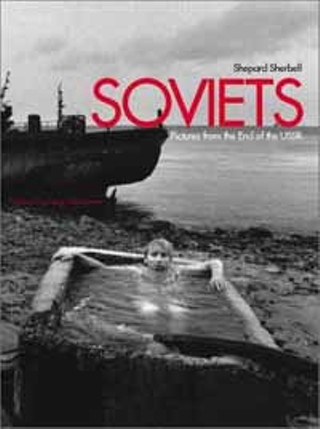Postscripts
Photojournalist Shepard Sherbell's visual record of the end of the USSR and Gerald Duff's new novel set on the Gulf Coast
By Clay Smith, Fri., Dec. 14, 2001

Shepard Sherbell Coming to BookPeople
The first image in Shepard Sherbell's Soviets: Pictures From the End of the USSR (Yale, $39.95) that seems stereotypically Soviet is a photo of the local Party chief in Kadamjai, Kyrgystan, perched at his desk under a portrait of Lenin. It's on page 37. He's checking his watch; in the Soviet system, most of the Party bosses also ran the factories, so it's easy to presume that he's monitoring whether his factory is bureaucratically running on schedule. He's probably just winding his watch, but old habits die hard. It seems impossible, even for young Americans looking at that photo, not to think of everything our Cold War propagandists told us about mind-numbing Soviet bureaucracy. We hate the notion of a state that functions without a soul, but so did Gogol, who loved to deplore the apparatchiks. At the very least, there is more than one century of antipathy directed at that man. There are also photos of old women stacked in a line to purchase bad meat and images of draconian working conditions and prefab concrete structures that are intended to be people's homes. The brilliance of Soviets isn't just that Sherbell is the first photojournalist to pull off the mean trick of capturing the entire implosion of the Soviet Union but that he documents life continuing in spurts and small victories even though his book is subtitled Pictures From the End of the USSR.
From 1990 to 1993, Sherbell, who will present Soviets at BookPeople on Monday, December 17, at 7pm, worked for the German weekly Der Spiegel, whose editors would say things like "Cover military training in the new Ukraine" and let him be (Sherbell, who is American, explained in a recent interview with the Chronicle that "American editors work very differently. They like to call you everyday and take your temperature and see what's going on. German editors, characteristically, give you an assignment and say, 'I'll see you when it's due.'") Divided into seven sections with titles like "Work," "Belief," "Energy," and "Punishment," Soviets satisfies our curiosity by thoroughly breaching the cloak that surrounded the Soviet Union for so long. Asked how he managed to cover a nation that encompasses one-sixth of the earth's surface, Sherbell said, first of all, that he had four assistants: a secretary, a traveling assistant, a Moscow assistant, and the fourth, who worked in the darkroom "and also bought things because it was very hard to buy anything -- toilet paper, rubber bands, you name it." Many of the photos in "Punishment" are taken in Dimitrovgrad, a labor camp east of Moscow for young men age 14 to 18. Getting in took two years of work from his secretary, he said. "I think she started calling about late 1990 or early 1991 and I got in by 1992. You just keep whacking at it and whacking at it and then when they're ready for it, they'll let you know. They'll respond, but it's an endless process of badgering."
Gerald Duff at Borders
We've praised the prolific Gerald Duff's mysteries before, but now the native Texan has a novel set on the Gulf Coast. At first glance, Coasters (New South Books, $25.95), the story of Waylon McPhee, reads like a guide on what not to do if you're middle-aged and divorced: Waylon has moved back in with his father, who's dating again, gotten involved in an affair with an obsessive married woman, and revived his interest in the prom queen from his old high school, where he's begun substitute teaching. Duff will at the Borders on Research Blvd. on Saturday, December 15, from 11am-1pm, to explain all this.








